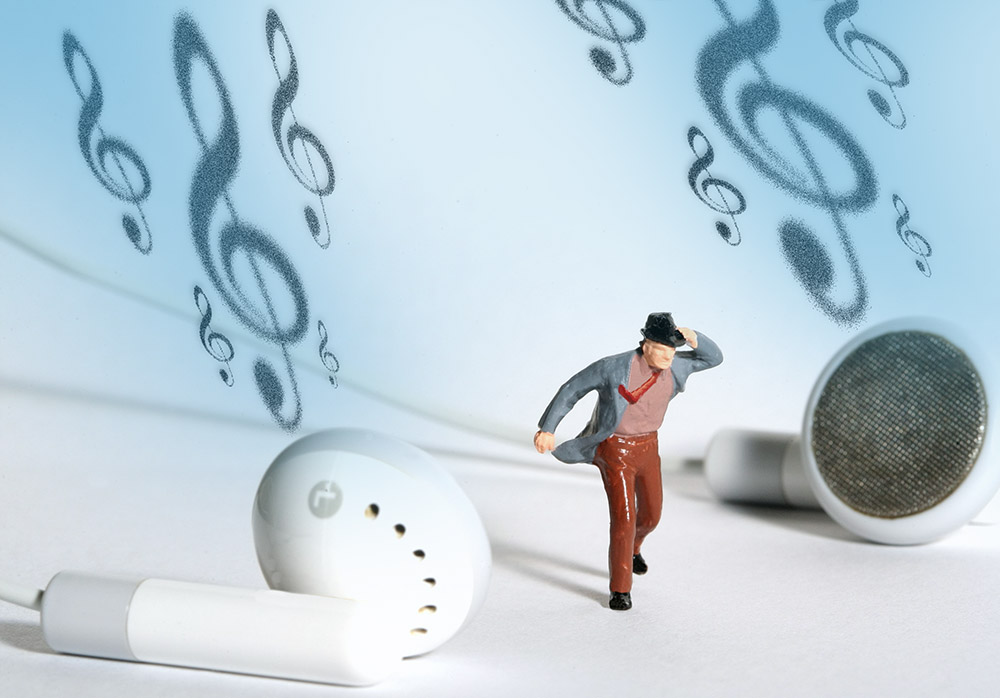[et_pb_section bb_built=”1″][et_pb_row][et_pb_column type=”4_4″][et_pb_text]

#1 Learn to Filter Noise at Home
When you workout your ears, are you working out your mind too? Sound filtering is the phrase we use when talking about how focusing on something essential and filtering out the sound distractions in the room. Exercising this skill keeps it sharp and that means you are able to understand a conversation even in a noisy space.
You can start your practice with music from a couple of different devices – maybe use the TV and your laptop. Now, ask a friend to sit with you and talk. Take time to focus on the conversation while ignoring the music playing around you from the various devices. Work this exercise in a room where you can change the environmental distractions easily like adjusting the volume.
How to do the Exercise
It’s a challenge for someone with hearing loss to listen to the conversation when there is a lot of distracting noise. That’s a problem most people have but one that is significant with serious hearing loss. Consider how a noise as simple as the heater or AC unit coming on could make hard to understand words unless you learn to keep your mind focused and your ears sharp with hearing exercises.
Begin your practice in a comfortable place. You’ll want to avoid fidgeting so you can focus. When possible, find a quiet place to do the exercise. It will be less frustrating if you have control over the distracting sounds.
Start a conversation and turn one device on low. Are you both still using your normal speaking voices? Can you hear the other person? If you answered yes to both keep moving on, if not, turn the volume down on the device until you can comfortably hear and speak with the other person.
After you’ve gotten used to filtering out one music source, try adding in the second one. To make it more challenging you can adjust the volume or add more devices. The best part is both you and your conversation partner will be doing something good for your ears and minds!
#2 Identify and Locate Sounds
Did you hear that? It’s the kind of question everyone asks regardless of hearing loss. The good news is by practicing how to locate a sound and identifying what’s making it is a proven way to strengthen your hearing.
Similar to the previous exercise, you won’t need a lot of fancy tools or equipment. It’s also a great excuse to get outdoors regardless of if you’re in the country or a major city. The idea is to surround yourself with varied sounds. The more diverse the environment the better!
How to do the Exercise
This simple exercise is great for your mental health because it’s actually working to strengthen the connections and pathways your brain uses to interpret information from your ears. In other words, it’s going to fine tune your mind so you can do more with less effort!
Simply find yourself a bustling atmosphere with comfortable seating. If you’re out shopping at a mall, the food court is an excellent choice. Close your eyes and try to hone in on a singular sound in the room. Use your mind and not your sight to help you determine what is making the noise. Could it be shoes clicking? Or perhaps it’s a child clapping their hands. If you’re having trouble identifying it try to get a sense of how big the object making the sound is, how it makes you feel, or even what type of material might be used to make the sound. All of these small deductions will help you figure out the noise source, but more importantly, strengthen your ears and mind.
#3 Play Brain Games
Not every hearing exercise has to be work. You can improve all of your senses, including your hearing, by strengthening your mind. Since your brain is your internal translator you can improve its ability to distinguish sound by improving its overall functionality. While a medical professional can recommend specific games to improve your mental focus there are many you can start off doing on your own.
How to do the Exercise
There are countless games for one or more players that can help with this exercise. Any kind of logic or strategy game will help and it can be on your tablet, on your table, or in the newspaper.
Speaking of newspapers, crosswords and Sudoku are excellent options for someone who wants to practice flexing their mental muscles solo. Even activities like crocheting can help keep your mind strong. Memory games are also great as they can be as simple as a card game or as exciting as a shell game. If none of those appeal to you there are still more options. For example, a simple Rubik’s cube can offer up hours of pattern recognition and problem-solving practice.
Of course, there are more social ways to play brain games such as playing chess, checkers, or scrabble. It doesn’t matter what you choose so long as you’re using your noggin!
[/et_pb_text][/et_pb_column][/et_pb_row][/et_pb_section]